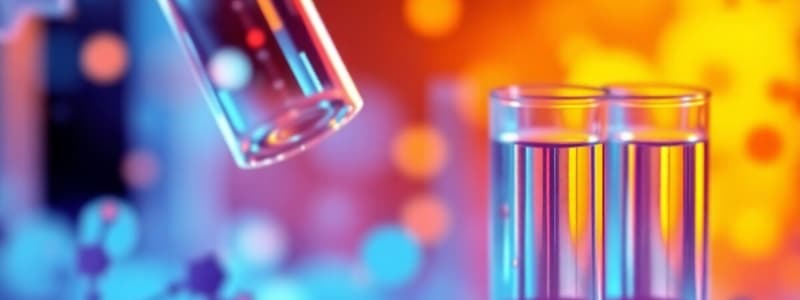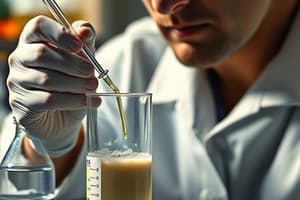Podcast
Questions and Answers
What is the basic principle of the Lowry Method for protein concentration measurement?
What is the basic principle of the Lowry Method for protein concentration measurement?
- Divalent copper ions are reduced to monovalent ions by peptide bonds. (correct)
- The presence of protein causes a reaction with oxygen to produce color.
- Divalent copper ions form a complex with water.
- Peptide bonds react with Folin reagent producing a stable blue product.
Which of the following statements is true about the Bradford Method?
Which of the following statements is true about the Bradford Method?
- It exhibits a color change based on the interaction of the dye with RNA.
- It requires the use of high temperatures to activate the dye.
- The dye Coomassie Brilliant Blue G-250 undergoes a color shift when binding to proteins. (correct)
- It is based on a decrease of dye absorbance under alkaline conditions.
What wavelength does the BCA method's complex absorb light most strongly?
What wavelength does the BCA method's complex absorb light most strongly?
- 650 nm
- 720 nm
- 562 nm (correct)
- 400 nm
Which protein assay method shows the highest sensitivity for protein concentration measurement?
Which protein assay method shows the highest sensitivity for protein concentration measurement?
In which conditions does Coomassie Brilliant Blue G-250 dye exist in its anionic form?
In which conditions does Coomassie Brilliant Blue G-250 dye exist in its anionic form?
What experimental technique is used to measure the amount of light absorbed by solutes in a solution?
What experimental technique is used to measure the amount of light absorbed by solutes in a solution?
What reaction does the BCA method rely on to form its color complex?
What reaction does the BCA method rely on to form its color complex?
What is the role of the Folin reagent in the Lowry Method?
What is the role of the Folin reagent in the Lowry Method?
Which protein quantification method is considered the method of choice for determining the purity and chemical composition of a protein or peptide?
Which protein quantification method is considered the method of choice for determining the purity and chemical composition of a protein or peptide?
What is the primary application of protein quantification in biochemistry research?
What is the primary application of protein quantification in biochemistry research?
In UV Spectroscopy, what does the A280 measure?
In UV Spectroscopy, what does the A280 measure?
Which colorimetric assay is known for its rapid and simple method of protein quantification?
Which colorimetric assay is known for its rapid and simple method of protein quantification?
What wavelength range is typically analyzed using fluorescence emission for protein quantification?
What wavelength range is typically analyzed using fluorescence emission for protein quantification?
Which chemical is used in the Amino Acid Analysis procedure to react with free amino groups for UV detection?
Which chemical is used in the Amino Acid Analysis procedure to react with free amino groups for UV detection?
What is the ideal sample size required for effective amino acid analysis?
What is the ideal sample size required for effective amino acid analysis?
Which statement accurately describes spectroscopy in the context of protein quantification?
Which statement accurately describes spectroscopy in the context of protein quantification?
Flashcards
Protein Quantification
Protein Quantification
The measurement of protein concentration in a solution.
Amino Acid Analysis (AAA)
Amino Acid Analysis (AAA)
A method used to determine the purity and chemical composition of a protein or peptide by breaking it down into its individual amino acids.
UV Spectroscopy
UV Spectroscopy
A technique that uses UV light to measure the absorbance of a solution at a specific wavelength. This can be used to quantify protein concentration by measuring the absorbance of aromatic amino acids, peptide bonds, or fluorescence properties.
Spectroscopy
Spectroscopy
Signup and view all the flashcards
UV Spectroscopy-A280
UV Spectroscopy-A280
Signup and view all the flashcards
UV Spectroscopy-A205
UV Spectroscopy-A205
Signup and view all the flashcards
Fluorescence Emission
Fluorescence Emission
Signup and view all the flashcards
PITC
PITC
Signup and view all the flashcards
RP-HPLC
RP-HPLC
Signup and view all the flashcards
Colorimetric Assay
Colorimetric Assay
Signup and view all the flashcards
Lowry Method
Lowry Method
Signup and view all the flashcards
BCA (Bicinchoninic Acid)
BCA (Bicinchoninic Acid)
Signup and view all the flashcards
Bradford Method
Bradford Method
Signup and view all the flashcards
Spectrophotometry
Spectrophotometry
Signup and view all the flashcards
Spectrophotometer
Spectrophotometer
Signup and view all the flashcards
Protein Assay Sensitivity
Protein Assay Sensitivity
Signup and view all the flashcards
Study Notes
Protein Quantification Lab 8
- This lab covers protein quantification, a crucial biochemical technique
- It's used to determine protein concentration in a liquid sample
- Important in biochemistry research, enzymatic studies, and biopharmaceutical lot release
- The lab focuses on various methods for measuring protein concentration
Protein Quantification Methods
- Spectroscopic procedures:
- UV Spectroscopy (A280): Measures absorbance of aromatic amino acids, used for highly purified proteins (20-3000 ug/ml)
- UV Spectroscopy (A205): Measures peptide bond absorbance, used for less purified proteins (1-10 ug/ml)
- Fluorescence emission: Measures fluorescence emission of aromatic amino acids (5-50 ug/ml)
- Amino acid analysis (AAA):
- Breaks down proteins into their component amino acids
- Determines the identity and relative amounts of amino acids
- Uses HPLC for separation and quantification
- Requires 0.05 nmol or 2.5 ug of sample
- Colorimetric assays:
- Used to measure concentration using a color change
- Lowry method: Measures protein concentration based on cupric ion reduction and subsequent molybdenum/tungsten blue formation
- BCA (bicinchoninic acid) method: Based on the reduction of copper ions and subsequent complex formation with bicinchoninic acid, generating a purple color (0.5ug/ml)
- Bradford method: Uses a dye shift to determine protein concentration. The dye changes form from red to blue as it binds to protein (10-100 ug/ml)
Spectrophotometer
- Definition: An instrument that measures the intensity of light transmitted or emitted by a substance
- There are various types based on the wavelength range being used, including visible, UV, infrared, UV-Vis, UV-Vis NIR
- Use: Calibrate with a blank (solvent only), choose the correct wavelength to analyze, and measure the sample's absorbance three times
Spectroscopic Procedures
- Definition: The study of interaction between matter and electromagnetic radiation
- Spectrophotometry: Measures the concentration of solutes by determining the light absorbed by those solutes
Studying That Suits You
Use AI to generate personalized quizzes and flashcards to suit your learning preferences.




